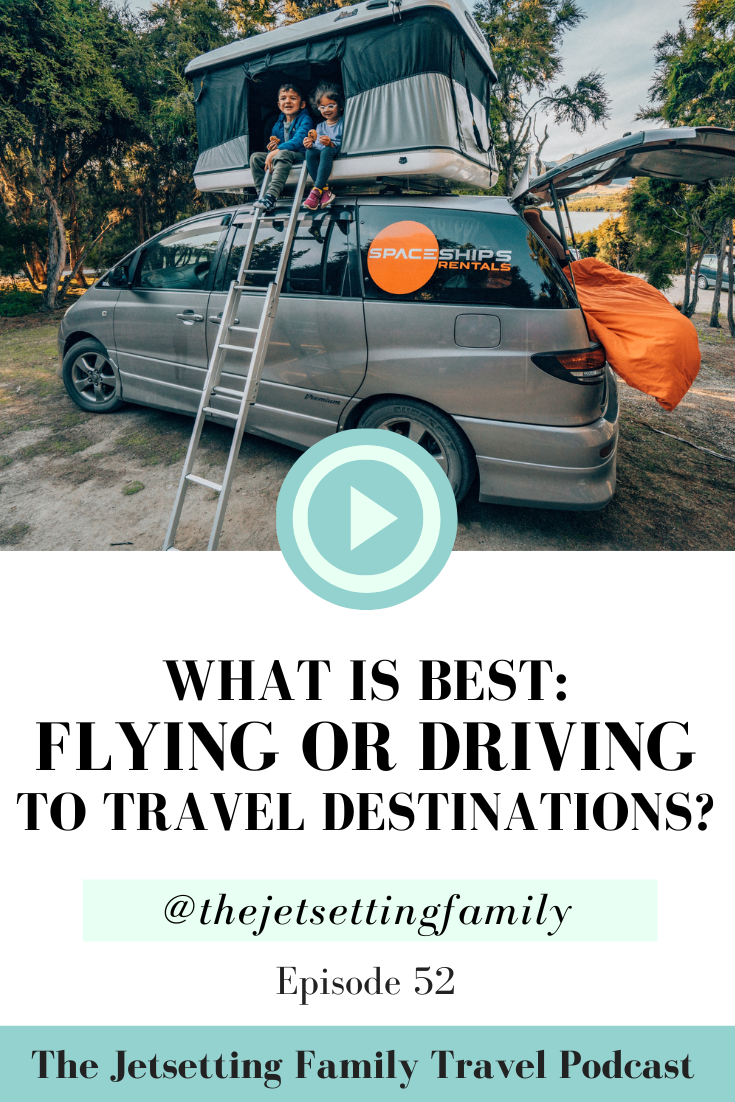Today we’re talking more about the journey! Specifically, what is the best way to get to a travel destination? Let’s dive deep on whether it’s better to fly or drive to places based on a few factors: flexibility, budget, destination, and time.
Listen and Subscribe on: Apple Podcasts, Spotify, Google Podcasts
Resources
- Travel tips for flying with kids
- Podcast episode: Iceland road trip
- Podcast episode: Ireland road trip
Transcript
Rod: Welcome to the Jetsetting Family Travel Podcast. I’m Rod. And I’m Jess. And today’s episode is going to be more about the journey than the destination.
Jess: Yes. This summer guys, we are doing a road trip and one of the questions we keep getting asked is, why don’t you just fly there? So we thought it was an interesting topic to talk about the difference between flying and driving to a destination. Kind of the pros and cons to each and why, you know, sometimes we decide to do one over the other.
Rod: Yeah. So I think the way that we want to structure this is we came up with a couple of different factors of things that are important to consider when it comes to choosing a mode of transportation, right?
So some of these are involved things like flexibility, budget. Destination or time. So there’s going to be really good things and bad things about driving and flying that are going to apply to each of these. And granted, depending on where you want to go, that’s probably going to be the most important thing, right?
You don’t want, or you probably can’t drive from here all the way to say Europe. But yeah, maybe we can start there on the destination piece. So Jess, what are, what are some things to consider when it comes to choosing a method like driving or flying and finding the right destination to go to?
Jess: For us, I think one of the things I consider heavily is how long do we plan to spend at a destination, and are we just going to be at one? Local destination, are we going to choose to see a wider area? So for instance, we are doing this East Coast road trip where we plan to see New York City, Boston, and all of these places are far enough apart from each other.
It would be harder to fly there, rent a car. And spend the money on a rental to get all the way around or to fly in between destinations and pick up multiple rental cars. So since we’re going for longer than a week, we’re going for about a month and we plan to see areas covering a vast amount of land.
It made more sense to have a car for the entire time for that trip. So I think kind of duration and like amount of air you’re going to cover and how much public transportation can you actually get between those destinations. For some cities it’s really hard, especially in the US, we really lack infrastructure when it comes to public transportation, especially getting from like city to city.
So, you know, are you going to fly between those cities? Do you have to rent a car? And kind of those expenses add up. So if you can actually drive your own car and have it with you, sometimes it just seems to logistically make more sense. But there are a lot of cons that come with that too.
Rod: Right? Yeah. And in terms of the destination itself, I think.
There’s going to be times where you’re going to have to do both, right? So for example, when we went to Ireland, we flew into Ireland, we had a decision to make, do we want to spend time in Dublin versus go and explore the countryside? And that really was the decision of do we just not get a rental car or get a rental car?
And we decided on that case that we were going to get a rental car. There’s other situations like when we went to Europe, we said we’re not going to get a rental car, but we are going to get a train pass so we can go from train station to train station, but once we’re in an actual city, we’re just going to be walking around and, you know, trying to find the things that are within walking distance to us.
So yeah, I think the destination is really the number one thing I think that is going to determine whether you’re going to fly or drive. But there’s other factors that are involved, right? Of, hey, maybe destinations not necessarily our highest priority. There’s a couple of places that we can decide, between, or if you can drive or fly to both of the locations, then this is where some of these things come into play.
Jess: I think one of the biggest things as far as destinations is make sure you research what is the public transportation in that area. Does the public transportation get me to the sites or other de like. It things I want to see while on that trip. And then a cost comparison. Guys, I was an accountant prior to all this, and I love a good Excel spreadsheet.
When we did Ireland, that was something we really did. We cost out doing private tours or like public tours versus renting a car and doing everything on our own, and so costing that out. If you’re going to go to Switzerland, what is the train ticket going to cost versus renting a car? What is worth it to you?
Because having a car does offer the next point, we’re going to talk about flexibility. You are not on anyone else’s schedule but your own. And there is something beautiful to that.
Rod: There is, yeah. And I think the, the con in flexibility for air travel is, you’re going to be limited to what you initially booked.
It’s very hard or expensive to try to change flights because you either want to leave earlier or later or come back earlier or later. And a lot of that is, you know, it is going to be a very fixed kind of trip. So with a car, you, you have flexibility where if you’re doing a road trip or you have more time, then you’re going to be able to flex and find wiggle room where you want to cut your time short at one place or another. So it’s, it’s a lot easier to make those kinds of decisions when you have a car with you.
Jess: The next point. That’s kind of not one of our top affecting decisions, but it does affect my decision. Cause I’m a mom.
My kids are awesome on a flights. I will brag about that because I’m proud of them. They,
Rod: after a hundred of them, then you would hope that they’d be.
Jess: Awesome on a flight. So, we have a system down packed. It really works out. Either Rod sits with a kid or I sit with a kid, or one of us sits in between the kids and the other parents in the aisle.
So they’re not right next to each other. It’s the one day they have unlimited tablet time. I mean, I could do an 18-hour flight with my kids tomorrow and I would have zero stress about it and know that it’s going to be smooth sailing. So for me, that is a beautiful perk. Yeah. I put my kids in the back of the car and we can’t even go to the grocery store five minutes from here without an argument or some sort of fight or some sort of whatever, just because.
I don’t know. I guess they’re in a car more than a plane, but they’re just awful in the car because they’re next to each other and one wants a song, one’s singing the person’s song, one wants something else. I mean, it’s just, I don’t know what happens in a car. Yeah. And since our kids, especially Nora gets carsick when in the car she can’t have an iPad and so on these longer trips, I mean like for us, when we drive to New York this summer, it’s a 14-hour drive.
I would way rather have a 26-hour flight personally than a 14-hour drive. Cause they know my kids will be saints on that flight. Right. They know I’m driving, we’re distracted, we’re focusing on the road, and they just take advantage.
Rod: Yeah. Yeah. And I mean, you have to be paying attention on the road while you’re driving, so it’s not like you can be more passive as you are on a flight.
I think yeah, that’s something that you have to balance. It’s are your kids used to flying versus driving? And what is your patient’s threshold towards being able to withstand driving 20 hours instead of having like a simple three-hour flight. One of the other things about driving, I would say that is good is you, you’re able to carry more stuff in general, right?
So if keeping your kids entertained on the car ride is a priority, then you can take more games, more little activities than, than you could if you were limited to either your luggage or backpacks that you have to carry on onto a flight. So that, and, and not just for the trip itself, but also, you know, not having to worry about baggage limits and sizes and whether you’re going to have to pay for a check-in luggage, what kind of seats you’re going to be assigned to, and those kinds of things that are a bunch of wild cards.
When it comes to flying. It’s a lot simpler, especially, I mean, we have a minivan, so we just pack that thing up and it’s been as reliable as always, takes us to the right places. We can ditch some things if we need to. But generally, there’s enough space. To hold all of our stuff, the luggage that we need.
Some toys, sometimes we bring their kids their scooters, mini bikes. I mean that thing will hold anything and everything. Whereas going by plane, we wouldn’t have that flexibility.
Jess: I call our minivan the Great White, but I also call it our Spaceship because it does magical thing. That’s right. But I don’t know if it’s just me, maybe you guys relate to this, but like if I have space for something, I take stuff whether I need it or not.
So like, yeah, fill it up. We fill it up. So if you tell me I can take three suitcases for free, you better believe I will fill three suitcases, even though I probably only needed two. Yeah. I am really great at filling that van to the brim with things I probably don’t need for the trip, but it brings me comfort to know if I do, they’re there.
Rod: Yeah, especially if you’re doing a road trip where you’re going to multiple destinations and you’re constantly having to load and unload and play the Tetris game of loading your car. That does tend to get a little bit tiring and old after a while. So, you know, depending on, and it’s probably even worse if you don’t have a minivan, you’re just taking a car.
It might be a little easier if you’re doing an RV, but then that introduces even more issues of do you stay at an RV park? Can you drive around and park in the city with a big rv? Do you tow a vehicle behind it? So then you have even more flexibility. So yeah, it might take more time to plan and execute than it would when you’re just flying and you get there.
But overall, it could be worth it depending on where you’re going.
Jess: As far as RVs go. This is kind of like segueing. We have done a giant RV, which the benefit was, is we never had to set up a bed and it was just, I mean, you park and you sleep. But we found a huge con is like Rod said, finding parking in the city, it’s driving through some of these European towns that are extremely narrow, was so difficult.
Yeah. And there were just. Issues with getting through things, but we also once did the pop-up van where like you have to park the van and set up the tent or whatever. Yeah, that worked great until you want to run a quick errand at eight in the morning and you realize in order to do that you have to take down everything down, put everything back in the van.
So even if you were staying four nights at one campground, if you needed to utilize that vehicle, it was a process every day. So yeah, and
Rod: the weather as well. If you’re getting rain, no matter how much they tell you that these popup tents are rainproof or weatherproof, that’s probably not going to happen.
New Zealand, it’s pretty rainproof. It was cold. I don’t know. I was setting up that tent in the rain. We went into there and that we were still getting wet because it was windy and raining. So it’s like directionally going in. Through the little like window holes on the side.
Jess: So, oh, the best part about that trip guys, is we drove like six hours before we realized they forgot to give us the linens.
Rod: Oh yeah. So we have to drive back and get the, or buy, buy. We went and bought, bought some, and then it rained and we ended up just, staying at a hotel for that night.
Jess: So we have found with our family of four, it’s harder if you’re a big family, but a family of four is one of those in between vans that are like smaller than like a giant motor home, but not like requiring popping things up.
It’s like kind of like a. The smallest motor vehicle you can get. Yeah.
Rod: The one that has like a tiny bed, or you can turn the little chairs into beds and then you have a bed overhead. Yeah. The one, the driving area is, I think that would be, that’s our sweet spot. Spot.
Jess: A nice little one. Yeah. But everyone’s different, so.
Other things about driving is it’s generally cheaper. I will say sometimes I see these Spirit airlines, which I have thoughts on Spirit Airlines. I appreciate their cheapness, but you really, it’s rough feel the effects of the cheapness. There are times on my back, spirit Airlines was probably cheaper actually with gas prices these days.
But overall, yeah, a lot of the times, especially if you’re not a solo traveler, you know, for us it’s not one plane ticket to New York, it’s four. So it ends up being cheaper. With that being said, we have to factor in the cost of a hotel cause it’s going to take us two days to get there. Yeah,
Rod: the hotel also, but there’s the hidden fees of parking fees.
So if you’re staying somewhere in a big city, then you might have to pay for parking, either at the hotel where you’re staying or really anywhere that you go and park. So that stuff can add up very quickly. The, the wear and tear on the car I think is also something you should consider when it comes to getting things like oil changes and updates and maintenance, that’s routine.
Then as you’re putting in that mileage in your car, then you’re really kind of shortening that lifespan for the vehicle itself.
Jess: So something we’re considering doing, because not everywhere we’re going on this trip is like a giant city. But when we do get to a city, if the hotel doesn’t include the rental of our car, I don’t want to spend $40 a night to park my car in like Washington DC or New York.
We have considered, and we might I’ll let you know after summer to drop our car off at the local airport for those few days and then just get public transportation into the city. And that way it’s much cheaper to park your car at the airport typically, or at a different parking site that we can find that’s much, much cheaper.
And just pay to leave it there and use, like, you know, in New York and in DC you don’t need a car within those cities. It’s walkable. There’s public transportation. So that’s something we’re going to try to do to reduce cost.
Rod: Yeah. Yeah. It’s going to be a nice little experiment. I don’t think we’ve done a lot of the big, like hybrid kind of trips. It’s either full RV or only flying and maybe some train. So this time we’re going to a bunch of different places, both in the countryside and in metropolitan cities. So it’s going to be trying to, I don’t know if it’s fun figuring it out, but it’s something that we’re going to have to do anyway.
Jess: But I think one of the beauties of either renting a car, driving your own car for a road trip. We did a big road trip several years ago through Arizona and some of Utah and Colorado. Yeah. And it was so amazing being, just having that flexibility to be like, we’re at Arches National Park and we wanted to stay for sunset, or, hey, we saw this beautiful thing.
And kind of being able to change our trip up depending on what interests us in that moment. Which I think a lot of times when we fly to a destination and we do group trips or we just stay at that local hotel or whatever, yeah, we kind of lose that freedom.
Rod: Yeah, the freedom is huge. I mean, freedom is the name of our game.
It’s like we love having the flexibility and freedom to do things, and I think that’s why this time, this summer, instead of flying to New York or flying to Boston and taking either the train or bus from place to place, I think we’re just going to make an experience out of it. And I think the, also, the other factor that really comes into consideration here is time, right?
So we are blessed to be able to work remotely and we have our own business where we’re building digital products or working on the podcast or our blog or social media. And we don’t have to necessarily plan time off to go do these kinds of things. So we’re incorporating this trip with our daily routine of how we work and live.
The kids are going to be out of school at this point. So we do have that flexibility to be able to take a whole month to be driving from place to place. If we have to take time off and we only had a week then we’d most likely be flying somewhere, spending those couple of days there. Or planning a very smaller in scale kind of trip.
That would be manageable for the time that we do have. Which is a big benefit for flying is that you can go further in shorter amounts of time than you would if you were driving.
Jess: I think for me the sweet spot, which we’re not doing this summer, is the hybrid trips. Like we flew to Iceland and then we had the rental for the seven days.
And when we first did Iceland, it was a huge debate. If you have not listened to our Iceland podcast, you should the great debate. RV or car. Yeah. We ended up doing a car. But the other debate at the beginning was, should we do private group trips? And there’s pros and cons to that aspect of as well.
I think you do get more information. So when you’re doing it on your own, you definitely should research before you start your day so that you’re not just looking at sites without any idea of the history or anything about them. But, not being on a trip at the, the schedule of a tour guide or of a group, and really just having that freedom to explore for me, was invaluable. Like I thought it was an incredible way to see a country.
Rod: Yeah. So just as a summary, I think the, the factors that we were talking about, the first one of these is flexibility. I think generally you have more flexibility if you have a car than if you are flying, in terms of budget.
That one is a toss up depending on where you’re going. If you’re going to have all these hidden nickel and dime parking fees, wherever your destination is. But generally, I think cars would require a lower budget than if you were flying. And destination. I think that one, I would probably say flying because flying places unlocks all the types of destinations all over the world where driving you’re really just limited to the local area where you’re at or your country, your landlocked kind of places.
And last is time. That’s a big benefit for flying. You gain back a lot of time. You don’t have to spend a bunch of time actively driving, having to manage the kids in a car for 10 hours at a time or however long it is that you’re going somewhere where if you just take the three hours to fly somewhere and you can manage that experience and you have a whole bunch of time back.
Jess: Yes, it’s totally up to each person on what works best for them. I know there are some families we follow who are giant road trip families and that’s what they specialize in. We have obviously flown way more and done more of these hybrid trips, so this summer is kind of a new adventure for us.
Pray that these kids get along in that backseat. Yeah.
Rod: Yeah. It’s a big difference in last year where we flew, I think. We had a pretty crazy flight schedule. We flew from here to Colombia. We went from Colombia, a couple of different cities there over to Nevis, but we have to stop in the US first in Miami.
Before we got to Nevis from Nevis, we flew to Texas, from Texas to California, California and back. So that was a trip that we couldn’t have done on a car. And this year it’s a trip that we probably could do on a flight, but it would be a lot more expensive and less flexible to be able to plan all these different locations that we want to go visit along the East Coast. So,
Jess: yeah. So good to give you guys like a little glimpse of our itinerary this summer. We’re doing the Catskills, then we’re doing Martha’s Vineyard. And we plan to stop in Boston. Washington, dc New York, New York City, city, new Delaware, and maybe like the Carolinas on the way back.
And so we’ll kind of see we have flexibility since we’re in the car to kind of make adjustments to this trip. Yep. As we go. But we’re excited. We haven’t really spent, well, Rod went to college on the East coast, but like as a family with the kids, the kids have never been to New York. Yeah. So I’m excited for them to see like, I don’t know, especially Santi, who’s now big city life.
Yeah, yeah. And Santi’s now like doing US history at school. So I think like he did DC when he was a really little kid, but like now he’s learned a lot about US history. So, I just think it’s going to be a really fun road trip with the kids at the ages that they’re at.
Rod: Yeah, so we’ll see. We’ll probably have a rundown of how that goes later on in the summer.
But you know, if you enjoyed this episode, make sure that you are subscribing. We’ll post all the show notes for this episode and some resources that we’ve written about travel tips on our blog, which is www.thejetsettingfamily.com/episode52. And if you want to reach out to us if you have any questions or you’re planning a trip and you can’t decide whether you should drive or fly there and make sure to get ahold of us.
We’re on Instagram @thejetsettingfamily. You can always email us: hello(At)thejetsettingfamily.com
Jess: Until next week, guys, we hope you have a wonderful time planning your summer travels and hope to hear about some of them. But until then, Happy Jetsetting!










